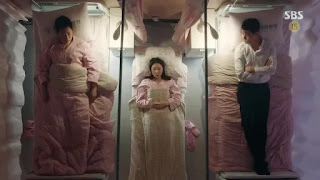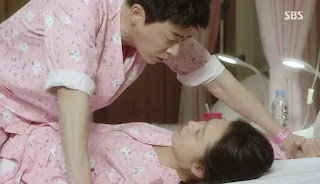K-drama Review: Don't Dare to Dream
I've never before given a K-drama a half star, but this show feels just shy of 4 stars and too good for 3 stars, so I'm rating it 3.5. Read on to find out why...
English Title: Don't Dare to Dream (2016) Also known as Jealousy Incarnate
Writer: Seo Sook-hyang
Directors: Park Shin-woo (Ep. 1-24) and Lee Jung-heum (Ep. 5-24)
Length: 24 Episodes
Tropes: Enemies to Lovers, Love Triangle, Workplace Romance, Unrequited Love
My Score: 3.5/5
Description: For three years, weather reporter Pyo Na-ri (Gong Hyo-jin) has had an unrequited crush on Lee Hwa-shin (Jo Jung-Seok), a haughty reporter at her TV station. But that changes when she meets her perfect man — his best friend, chaebol heir Go Jung-won (Go Kyung-pyo).
If you enjoyed this show, then watch: Hospital Playlist, Love Next Door, Our Unwritten Seoul, Lovestruck in the City and Pasta (same leading lady and screenwriter)
I decided to watch this show because of leading man Jo Jung-seok, who was delightful in Hospital Playlist, however it was only after I started watching that I realised this show hasK 24 episodes. This is the second K-drama in a row I've started without checking the number of episodes and been blind-sided by—I'm so used to the 16-episode format that I didn't expect either to be so long! I have to admit, I prefer shorter shows (do you have any idea how many K-dramas I still have on My List on Netflix to watch?!) but while this one could have been shorter, every single episode kept me engaged.
Jo Jung-seok absolutely delivered on my expectations. He's an excellent actor, with a wide emotional range (unlike the secondary male lead whose facial expressions were rather limited), good at both comedy and drama, and able to be funny, endearing, sexy, romantic, and intense—he's the complete package!
At the heart of this story is a love triangle, perhaps the most intense I've yet seen in any K-drama. Initially, there is no Team Lee Hwa-shin or Team Go Jung-won. At different times I wanted her to be with first one guy, then with the other, so when she said she felt like she had "two hearts" I completely understood how torn she felt between these two men.
The love triangle develops a rather progressive twist, unexpected for a K-drama, before it's resolved. While the male lead (ML) is a bit of a dick, by the time the triangle is resolved (admittedly dragged out an episode too long, in my opinion) we are very definitely rooting for him to get the girl. However, that's the reason I docked this show an extra half star—the triangle did carry on a tad overlong, making the female lead (FL) appear indecisive and as if she's stringing them both along. This drawn out to-ing and fro-ing in the middle section of the story may be because the writer was trying to fill 24 episodes.
While Don't Dare to Dream may have worked better with just sixteen episodes, in the end, it remained engaging for the full duration. Those additional hours are filled with subplots, secondary couples, and a wide cast of supporting characters, but the show still managed to keep a strong central focus on the love story between the leads without being de-railed by the sub-plots.
In episode one, the FL started out as a desperate stalker and came on so strong that I wasn't surprised the ML wanted nothing to do with her. She definitely had boundary issues, which I found a tad annoying until the purpose became clear when her constant groping of his chest helped the ML get an early diagnosis so he could beat his cancer. Beyond the chest-groping, her constant line-crossing with the ML felt inappropriate, especially when she was in a relationship with his BFF. While I was glad she later got to experience how it felt to be on the receiving end of unwanted attention when the tables turned and the ML realised his feelings for her, he was nowhere near as obnoxious in the way he pursued her.
Perhaps one of my favourite things about this K-drama is its representation of a number of issues. Breast cancer is central to the story, but this show takes it a step further. It not only raises awareness of breast cancer and the importance of early detection, but it also delves into the stigmas around male breast cancer, masculinity, and infertility as a possible result of radiation therapy. (And it was good to see the discomfort of mammograms acknowledged!)
Through the news broadcasts scattered throughout the show, there is commentary on issues such as air pollution, corruption, and the double standards between how those with money are treated compared to ordinary people...lots of hard hitting and topical issues! I especially loved the asexuality representation in one of the sub-plots (another love triangle!)
I also loved the two clever "Easter eggs" I discovered in the show:
- In a later episode, there's a reference to a past performance of Jo Jung-Seok's. He and the FL talk about the origins of love (referred to in the subtitles as the basis of love) which is a nod to the lyrics of the song, The Origin of Love, which he sang in Hedwig and the Angry Inch.
- While I laughed at the Hedwig reference, the earlier Easter egg at the end of episode 15 hit me hard. Having distanced herself from both her suitors, Pyo Na-ri goes on a blind date. We never see the man she's on the date with, but the references to her breakout role in Pasta are obvious to anyone who watched that show. For any other K-drama, that would have made me smile in glee, but instead it choked me up. I was grateful this was the final scene of the episode as I needed to step away to recover. Why? Her love interest in Pasta (Lee Sun-kyun) died tragically a year and a half ago. While Don't Dare to Dream was made before he died, the fact that they obscured his face felt like when shows have to cover up that they're using a double because the actor died, making it feel like a tribute rather than an Easter egg.
Those are the references to their past work I found, but I wonder how many others I may have missed because I haven't yet seen their other work!
This is yet another K-drama with a truly horrid mother. Chaebol heir Go Jung-won's mother is manipulative, and, despite being miserable in a loveless arranged marriage, she's willing to sacrifice her only child on the altar of arranged marriage, forcing him into an equally cold, loveless and miserable marriage just so she can win a few breadcrumbs from her husband. I really wanted to see her get her just desserts but nope, she never got punished. In fact, she was still being a bitch in the final episode, this time trying to prevent her brother from getting married, for no clear reason other than that she seemed to hate people being happily married! Unfortunately, as too often happens in K-dramas, the most terrible villains seldom get the justice they deserve. (The only show that got it right was Vincenzo. Yes, Vincenzo's form of justice was gruesome, but it felt so good!) I sincerely hope that the high number of despicable mothers in K-dramas is because of its popularity as a plot device rather than as a reflection of Korean society!
As a story editor, I question the need to give Pyo Na-ri a stepmother, young stepbrother, and an absent father. This seemed a pointless diversion. While the kid was cute and instrumental in forwarding the plot with his drawings, he could have been any neighbour kid. The stepmother played no part in either of her stepkids' lives, not attending parent-teacher conferences or even showing the slightest interest in her step-children, so why was any of this necessary? Why not simplify the story and make Na-ri and her brother orphans? That would have made her responsibility for her brother much more believable. On the plus side, Jo Jung-Seok is always adorable with little kids!
The final episode suggests another future love triangle for the younger characters, and then ends with not one but two epilogues. The first is set a year later (though the math on that doesn't quite work and two years would have been more appropriate) and another 40 years later in 2056. I wondered why the latter was included—yes, it was no doubt intended to show that this couple managed to live a very long life together, however, since Pyo Na-ri doesn't name her husband, for all we know, she may have been widowed and remarried! A slight tweak to the dialogue and subtitles here would have made all the difference—without it, they may as well have left out that scene.
As with many K-dramas, this show achieves an excellent balance between humour and drama. While there are many poignant moments, there are just as many laugh-out-loud-funny moments. There is also some fantastic chemistry between Pyo Na-ri and both her love interests—and some very steamy kisses! So all in all, a show worth watching, despite its 24-episode length.
This declaration from the final episode really sums up for me everything that's beautiful about Pyo Na-ri and Lee Hwa-shin's love story. This couple may have had a bumpy road to get together, but viewers are left in no doubt that their love is fiercely strong, healthy and will stand the test of time.











Comments
Post a Comment